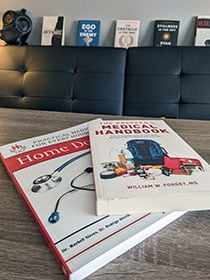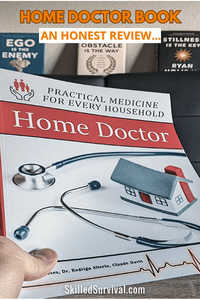
Hey, I’m Jack, and today we’re diving into the Home Doctor Book, one of the latest “do-it-yourself” medical guides making waves in the prepper community.
But here’s the million-dollar question: Does this book really deserve a spot in YOUR survival library, or is it just another shelf filler?
Stick with me, and I’ll answer that—and a whole lot more…
Note: If you prefer video content, here’s my review of the Home Doctor:
↓ Home Doctor Book Review – Is It Worth Buying?
Who Wrote The Home Doctor

Authors Credentials
When discussing medical knowledge, listening to qualified professionals is important. Why? Because no one should take medical advice from their barber or hairstylist! So, to trust what’s in this book, we must investigate those who wrote it.
It was written in a collaborative effort by three authors:
- Dr. Maybell Nieves
- Dr. Rodrigo Alterio
- Claude Davis
Let’s go over the credentials of each of these folks.
1. Dr. Maybell Nieves
Dr. Maybell Nieves is the head surgeon of the Unit of Breast Pathology and general surgeon at Caracas University Hospital in Venezuela.
She studied at the prestigious European Institute of Oncology in Milan, Italy, under Professor Umberto Veronesi. The European Institute of Oncology was inaugurated in May 1994. It’s a non-profit comprehensive cancer center.
The Institute focuses on prevention and diagnosis, education and training, research, and treatment of cancer.
Based on my research, these are all legitimate intuitions. And they’re still working on new medical advancements even today.
It seems to me Dr. Nieves has the proper medical credentials to write this book.
2. Dr. Rodrigo Alterio
Dr. Rodrigo Alterio works in the surgery department at UT Southwestern Medical Center in Dallas, Texas.
Most of his ongoing research is based on Surgical Oncology.
UT Southwestern Medical Center was established in 1939 and had many notable Laureates who went on to win Nobel prizes in their medical fields. And in 2017, Dr. Alterio lived with (and was the primary care physician of) an indigenous community called “Kamarata.”
Dr. Alterio served this primitive community deep in the Amazon Jungle, hundreds of miles from civilization.
During my research, I found that the “Kamarata community” is very remote. I can only imagine Dr. Rodrigo Alterio’s immense challenges in serving this community. This medical experience and expertise are exactly what you want for a book like this.
Dr. Alterio has first-hand experience performing medical treatment with limited resources. I believe Dr. Alterio has all the credentials necessary to help write an at-home medical book like The Home Doctor.
3. Claude Davis
Claude Davis is the author of several popular preparedness and survival books, such as:
But he’s NOT a doomsday prepper. Instead (like me), he wants to teach how to live a more resilient life.
His goal is to avoid placing his life (or that of his family) into the hands of others during a widespread emergency.
That’s why he’s spent his life honing his knowledge and experience in wise preparedness strategies. And he continues that mission by sharing his expertise within the Home Doctor.
Claude was paramount in translating the “difficult-to-understand medical jargon” into a handbook regular folks can understand.
Who’s The Book Home Doctor For?
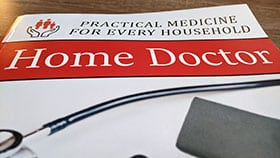
How do I know that? It says so right on the front cover! But that’s more marketing than helpful, right?
For example: This handbook may be too simple for YOU if you’re already a medical professional (or a certified EMT). And on the other hand, if you:
- faint at the sight of blood
- think the human body is disgusting
- or you content to remain part of what I call “The Fragile Masses.”
Well…then, this book is NOT for YOU either. It’s for those who crave to live a more resilient life.
Folks who want a PHYSICAL book (full of medical know-how) in case the world goes dark…
This book is a must-own for anyone who worries about the future and takes living a resilient life seriously.
Why live a resilient life? Because humans are terrible at predicting what’s coming next.
For example: We don’t know when the next disaster will wipe out an entire community.
- It could be a natural disaster such as a wildfire, wind storm, blizzard, tornado, etc.
- Or perhaps the future will bring about another world war, a nuclear holocaust, or failing nation-states.
Nobody knows these things, and if they claim they do…they’re lying. But with that said, what we DO know for an absolute FACT:
“The future will NOT be smooth sailing. Want proof? Just look at history; it’s full of one atrocity after another.“
So, instead of being fearful, you should focus on WHAT you CAN control. And that means living a more resilient life. And one small step towards resiliency is investing in PHYSICAL books, especially ones chock-full of medical wisdom and knowledge.
If you’re nodding your head right now, you agree. And that makes an ideal candidate for investing in the Home Doctor.
YOU are exactly who this book was written for!
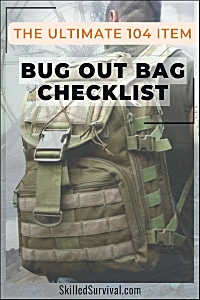
Want a free 104 item bug out bag checklist?
Enter your email below to instantly download this Complete Checklist PDF. No purchase necessary. 👇 👇What’s Inside This Book (& What’s Missing)
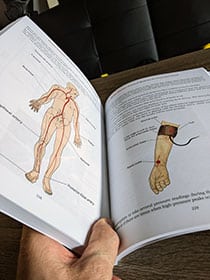
Now, this might not seem like much for a medical knowledge handbook. But that’s quite long considering its rather large footprint.
It’s over 8″ wide, nearly 11″ long, and over a 1/2″ thick.
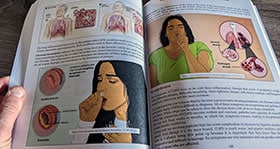
Why? Because this allows you to see all the colored images throughout clearly.
Just think HOW important that will be mid-surgery!
Following any medical procedure at home won’t be ideal. But at least with the Home Doctor, you’ll be able to see what you should be doing!
Let’s imagine the book was half as large.
Sure, it would have doubled the page count (608), BUT good luck squinting at the pictures!
What’s Inside
Ok, let’s take a close look at the written content. This book claims to be an “at-home worst-case medical handbook.” So it’s designed for use in an “apocalypse.”
A disaster so horrible professional medical advice and help are no longer available. It’s NOT for avoiding a doctor’s visit during normal times!
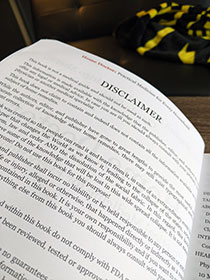
“This book was created so that people can read it and learn from it, in case of an extraordinary event like an Apocalypse that changes the World as we know it, learning to the collapse of the states, society, medical system, law, and order AND the dissolution of the social fabric. In this regard, this book’s purpose is to save some of the knowledge that will be lost in this widespread collapse. It is not meant to treat or cure anyone! Do not use this book for this purpose!”
OK, now that’s clear, what are some topics within?
There are many medical topics and subtopics throughout this book. So, instead of boring you going through each one, I’ll share a few I found interesting:
- 10 Medical Supplies You Need To Have In Your House
- An Ingenious Way To Stockpile Prescription Medications
- Medicines That Are Safe To Take After Their Expiration Date
- The Only 4 Antibiotics People Who Should Stockpile
- How To Preserve Your Mental Health In Spite Of A Rough Situation
- Gastrointestinal System
- Urogenital System, Raspatory system
- Mental Health
- Skin and Skin Appendages
- Head and Neck Trauma
- Musculoskeletal System
- Cardiovascular System
- Nervous System
So, as you can see, it covers the gambit of medical topics.
What’s Missing From The Home Doctor?
Of course, no 300-page (or 600-page) medical book can cover EVERYTHING.
Even after years of medical school and lifelong learning, you’d still not know EVERYTHING. Nor would you want THAT!
The level of detail and confusing terminology in such a book would render it meaningless for regular folks (like you and me). But that’s where I think this book gets it right.
It provides enough information to help with basic medical care (if professional help is unavailable). But not so much information to overwhelm or confuse.
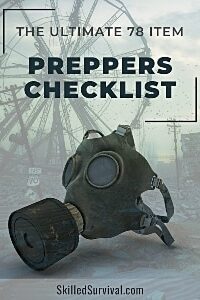
Want a free 78 item preppers checklist?
Enter your email below to instantly download this Complete Checklist PDF. No purchase necessary. 👇 👇My Final Thoughts / Recommendation / Pros & Cons
OK, here’s the deal, I own several medical handbooks. And I own more than 1 for two main reasons:
First, I like having multiple sources of information because a second opinion is never bad. Second, I have an audience that trusts my opinion.
I co-founded SkilledSurvival.com and TheResilientLife.com, and people depend on my advice. So, I need to review all these books to determine which are worth owning.
For example: Another medical handbook I own is called:
The Prepper’s Medical Handbook – How to provide medical care when you can’t rely on anyone but yourself” by William W. Forgey, M.D And it’s also a quality medical handbook I’ve previously recommended. But now that the Home Doctor is available, I think it’s the better option.
Why? Because it has better (and larger) images. Plus, it includes some additional preparedness info (such as stockpiling medical supplies and medications)
These strategic differences make it a more comprehensive Medical Handbook for those who want to live a more resilient life.
If you already own “The Prepper’s Medical Handbook,” you can pass on buying this one (if money is tight). But IF you want a “second medical opinion” in a DIY medical situation, then having two books is the answer. And perhaps you’d prefer an upgrade to one with better images.
If this sounds like you, then yes, you should also invest in this book. And if you don’t own either of these books yet, then The Home Doctor is the one you want.
It’s a solid medical handbook for folks like you and me who want to live a resilient life.
In Summary (Pros & Cons)
Pros
- Written by legitimate M.D.s and a Preparedness Expert
- Includes very large COLORED images so you can better see what’s going on
- It has comprehensive advice, without being long-winded or overwhelming
- It’s well-organized and includes a large font for easy reading
Cons
- It’s a bit more costly than comparable prepper medical handbooks
- You’ll get “upsells” after your initial order (upsells are more products behind the original order)
- It doesn’t fit as well in a small backpack; it’s bulky
- It includes some stark images of the human body (so you may want to keep it away from young, curious children)
Go here now to purchase your copy of the Home Doctor today.

Prepare, Adapt & Overcome,
P.s. - I just found out 2 out of 3 Americans don’t feel prepared for a 3 day disaster!!!
I guess this goes to show how modern society continues to embrace ‘living a fragile life.’ What’s crazy is… it’s so easy to fix.
To make sure YOU have the basics, watch our FREE training on “10 Simple Steps To Basic Preparedness” that shows you HOW.
Nothing crazy here… this isn’t doomsday prepping... just the basics every responsible adult should have before a disaster strikes.Why You Can Trust Skilled Survival...
Go here now to review a full breakdown of:
- Who We Are
- Our Credentials
- Our Mission
- & Product Recommendations...
Here are a few highlights of our teams credentials & certifications:
- Certified Member of a Mountain Search & Rescue Organization
- Plant Emergency & Safety Leader for a Major Food Manufacturer
- Member of the 10TH Mountain Division Hut Association
- Certifications: Avalanche 1, WFR, CPR
- Official Gear Tester for Numerous Outdoor Gear Companies
- Countless Multiday Backpacking trips into Remote Wilderness
- Bachelor's Degree In Mechanical Engineering
- Bachelor's Degree In Civil Engineering
- Bachelor's Degree In Biomedical Engineering
"It takes 20 years to build a reputation and five minutes to ruin it." - Warren Buffett
We're fully aware that trust is NOT something you GET but is EARNED.
And we'll continue to earn YOUR trust through our forthright and honest approach with each new Blog Post, Guide & Product we create...
P.s - I just took this FREE 60-second 'Readiness Score Quiz'👇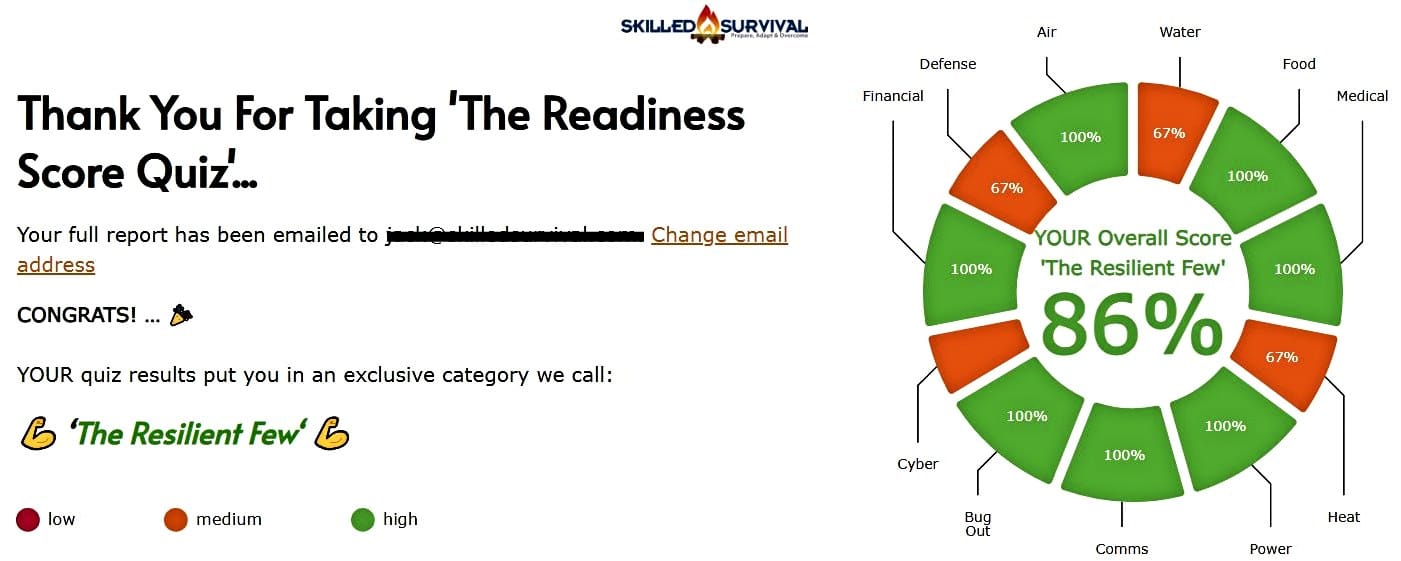
AND... I've still got a few gaps in my preps...🤔 But at least, I'm not part of 'The Fragile Masses'. 👍 Find out where YOU stand by answering a few questions...
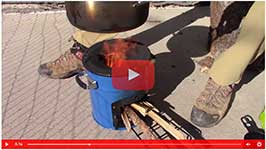
Recommended Reading
Trauma Kit: The Best Ones Used By EMTs
Not all medical kits are created equal, some are excellent, but many are not. We show you the difference and best trauma kit builds.
Best IFAK Kits For Serious Everyday Medical Emergencies
The best IFAK kits are innovative, compact, lightweight and 100% worth carrying! In this guide, we review the best ones on the market.
Tourniquet: The Best Ones Easy To Use In An Emergency
The best tourniquet is compact, effective, easy to use and 100% worth owning! In this guide, we review the best ones on the market.


